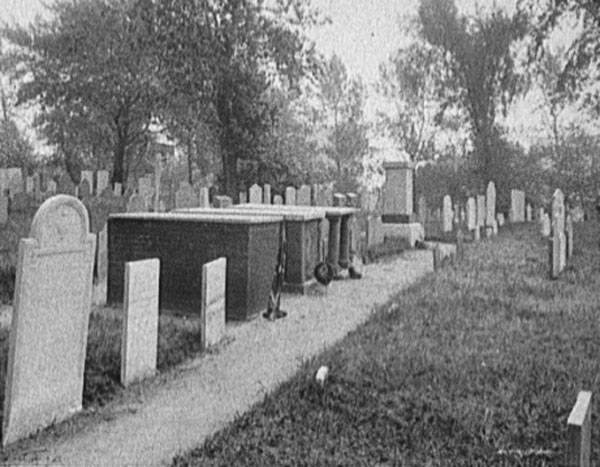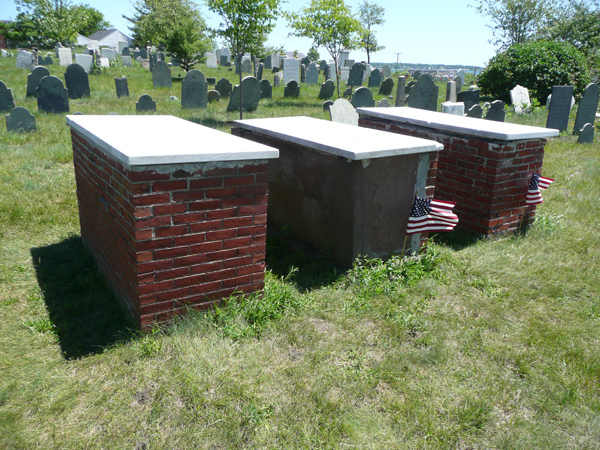The Captains of the Boxer and the Enterprise
During the War of 1812, a battle between the USS Enterprise and the HMS Boxer ensued off the coast near Monhegan Island. Although the British ship was defeated, both young captains perished in the fight; William Burrows and Samuel Blyth were interred next to each other in the Eastern Cemetery on September 9, 1813. One of the American sailors injured in the fight, Lieutenant Kervin Waters, was buried next to them 2 years later.

1900-10. “Graves of commanders of the Enterprise and Boxer, Eastern Cemetery, Portland, Me.” Library of Congress, Prints and Photographs Division, Detroit Publishing Company Collection.
Over the many years, the ledger stones that top each box tomb have been replaced. Today, Waters' grave is covered by a box tomb whereas older photographs reveal that it was a table-top tomb held up by 4 columns. Burrows' box tomb has been repaired; originally standstone, the south side of the box was replaced with brick and mortar.

Box Tombs of Captain Blyth, Captain Burrows, and Lieutenant Waters, Eastern Cemetery, Portland, Maine, June 2011. Photo by H. Doggett
Inscriptions
Captain William Burrows
Beaneath this stone moulders the body of
Captain William Burrows
Late commander of the United States Brig Enterprise
Who was mortally wounded on the 5th of September, 1813
In an action which contributed to increase the fame of American valor by capturing
His Britannic Majesty's Brig Boxer after a severe contest of forty-five minutes.
AEt. 28
A passing stranger has erected this memorial of respect to the memory of a Patriot
who in the hour of peril obeyed the loud summons of an injured country,
and who gallantly met, fought, and conquered the foeman.
Captain Samuel Blyth
In memory of Captain Samuel Blyth
Late commander of His Britannic Majesty's Brig Boxer.
He notably fell on the 5th day of September 1813.
In action with the U.S. Brig Enterprise.
In life honorable! In death glorious!
His country will long deplore one of her bravest sons
His friends long lament one of the best of men.
AEt. 29
The surviving officers of his crew offer this feeble tribute of admiration and respect.
Lieutenant Kervin Waters
Beneath this stone by the side of his gallant commander rest the remains of
Lieutenant Kervin Waters
A native of Georgetown, District of Columbia, who received a mortal wound,
September 5, 1813 while a midshipman on board the U.S. Enterprise
In an action with his B.M. Brig Boxer which terminated in the capture of the latter.
He languished in severe pain which he endured with fortitude until
September 25, 1815 when he died with Christian calmness of resignation
Aged 18
The young men of Portland erect this stone as a testimony of their respect for his valor and virtues.
A Description of the Event
From: Maine, A History, Volume 1
At first the war of 1812 bore lightly on Maine except for the interference with trade and the increase of taxation. It was more than a year after the outbreak of hostilities before there was any fighting of importance on her soil or near her waters. But on September 5, 1813, the United States brig Enterprise, Lieutenant William Burrows, captured the British Brig Boxer, Commander Samuel Blyth. Both commanders fell early in the action. The battle was decided by the Enterprise raking the Boxer, bringing down her mainmast and obtaining a position from which no adequate return could be made to her fire. The loss, of the Enterprise was 4 men killed and 10 wounded, that of the Boxer was 7 killed and 13 wounded, the mortally wounded being reckoned among the killed. The Enterprise was much damaged in the rigging, the Boxer in hull and masts as well, and it was with difficulty that she was kept afloat and brought into Portland.
There the dead captains were buried with all honor, the Americans with true chivalry including Captain Blyth in their tributes of respect. A stone, suitably inscribed, was placed over the grave of Captain Blyth by the officers and crew of the Boxer. Some years later, Samuel M. Burrows of New York erected a monument to Captain Burrows. Two years after the fight, Midshipman Waters, of the Enterprise, was buried by the side of his commander. He had been wounded in the battle, and 2 days later his injury was officially reported as mortal, but he lingered over 2 years, dying on September 25, 1815. He was cared for during this time by the young men of Portland, who also paid for a monument. Fifty years later, after the great Portland fire of 1866, his sister sent $300 to the relief fund, and a letter "expressing great interest in the city and sympathy for the suffering people."1
1Hatch, Louis C., ed. Maine: A History, Volume 1. Vol. 1. New York: American Historical Society, 1919.